The My Objects Widget allows users to view any objects associated to the processes they are tied to within the EPC. Customizing “My Objects” will allow users to view multiple different object types in one or multiple Widget windows based on personal preference.
Please follow the instructions below to customize the “My Objects” Widget.
1. Upon login, you will be greeted with the following page:
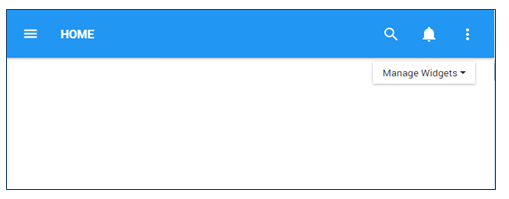
2. To add widgets to your home page, navigate to the the 
3. Once the “My Objects” Widget has been added to the Home page, select the 


4. Click on the “Settings” option and a pop-up window will be generated as follows
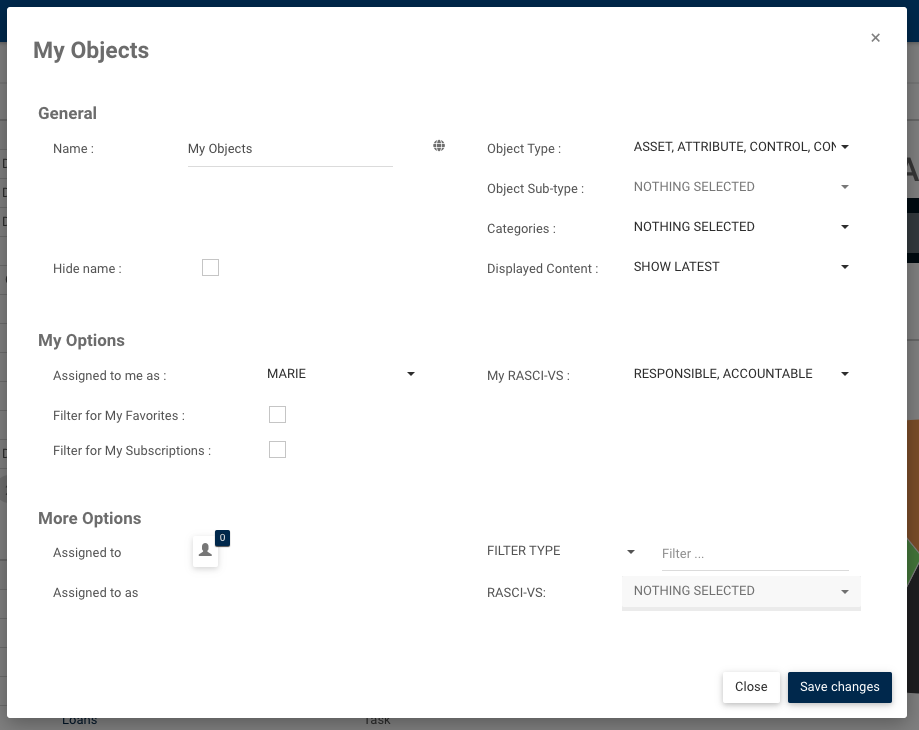
5. After customizing the settings, click on the 
My Objects Widget Settings Parameters
In the settings window, there are a number of parameters that a user can use to customize “My Objects” widget and improve their Home Page.
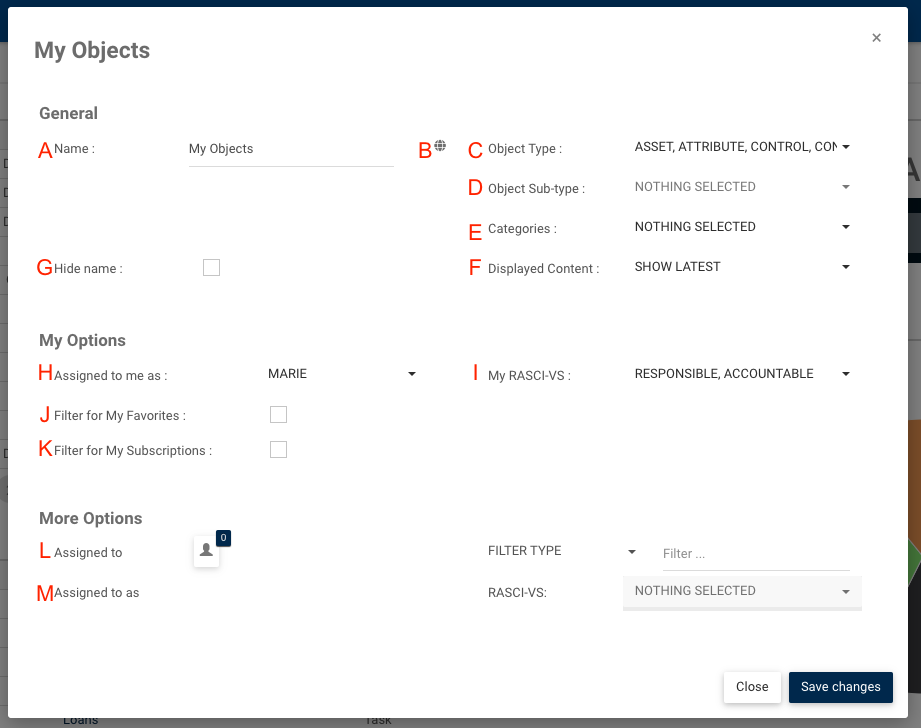
| Item | Setting | Purpose |
|---|---|---|
| A | Name | Allow user to customize the title of the Widget. |
| B | Multilingual Names | When clicking on the icon, it allows user to customize the widget name according for each content language supported by EPC |
| C | Object Type | The primary filter of the “My Objects”. Allow users to select a specific document type to be featured. |
| D | Object Sub-Type | Allow users to filter by the assigned object sub-types (sub-types can be manually assigned in the properties of an object). |
| E | Categories | Allow users to filter by the assigned object categories (categories can be manually assigned in the properties of an object). |
| F | Displayed Content | Allow users to filter by Show Latest, Published Only or User Profile Setting |
| G | Hide Name | Allow users to hide the display name of the widget. |
| H | Assigned to me as | Allow users to filter through their assigned Roles and Resources. |
| I | My RASCI-VS | Allow users to organize their Roles and Resources based on their level of involvement. |
| J | Filter for My Favorites | Allow users to sort specific objects by favorites vs. non-favorites. |
| K | Filter for My Subscriptions | Allow users to sort specific objects by subscribed items. |
| L | Assigned to | Allows users to filter objects that are related to other Roles, Resources, Org Units and Assets. |
| M | Assigned to as | Further criterion helping users view filter objects indirectly relating to personal Roles & Resources. Allows users to filter indirect relationships based on RASCI-VS criterion. |
A. Name: The “Name” Section will allow a user to customize the name of the Widget. To edit the “Name” section, please follow the instructions below
i. Navigate cursor over existing name box
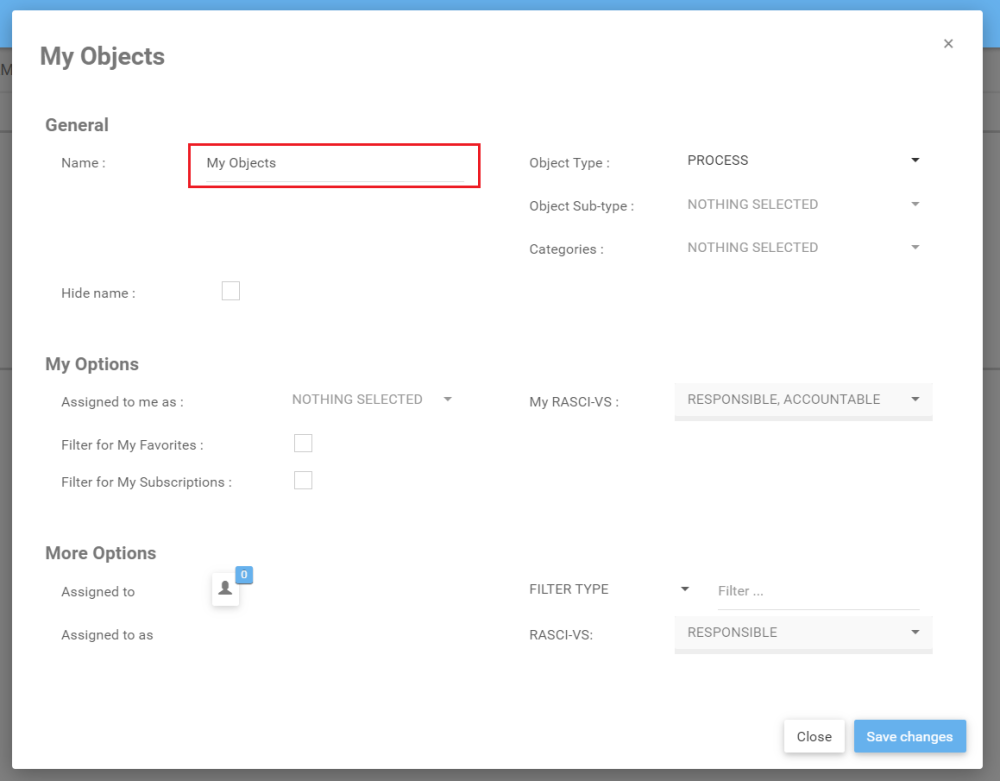
ii. Edit name by selecting name box and typing in desired name
B. Multilingual Names: This section lets users customize their widget names to all language supported by EPC or your organization. When toggling from a language to another, the name of the widget will change. To do so, follow the instructions below:
i. Click on the globe icon next the the “Name” field
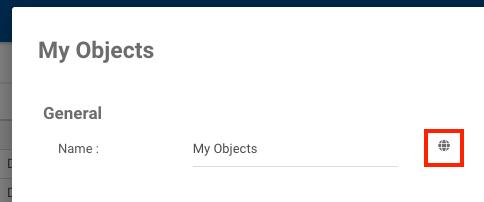
ii. In the pop-up window, enter the names wanted for each language. Click confirm when done.
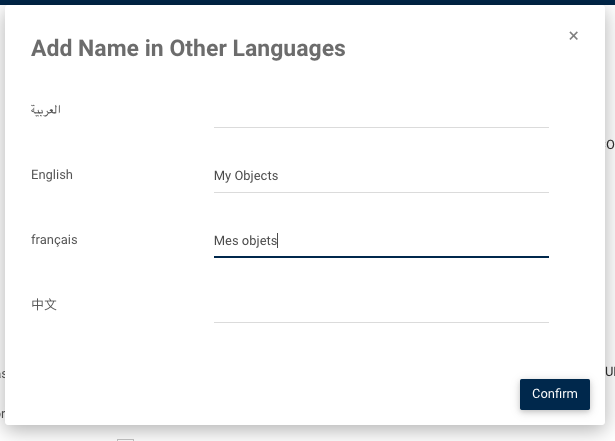
iii. The widget’s name will change when switched to another language:

C. Object Type: The Object Type is the primary filter when customizing the “My Objects” Widget. This filter should be set first, as all subsequent items are derivative of the Object Type. To select objects to be featured in a Widget, use the “Object Type” field and follow the instructions below:
i. Navigate cursor over the object type task bar
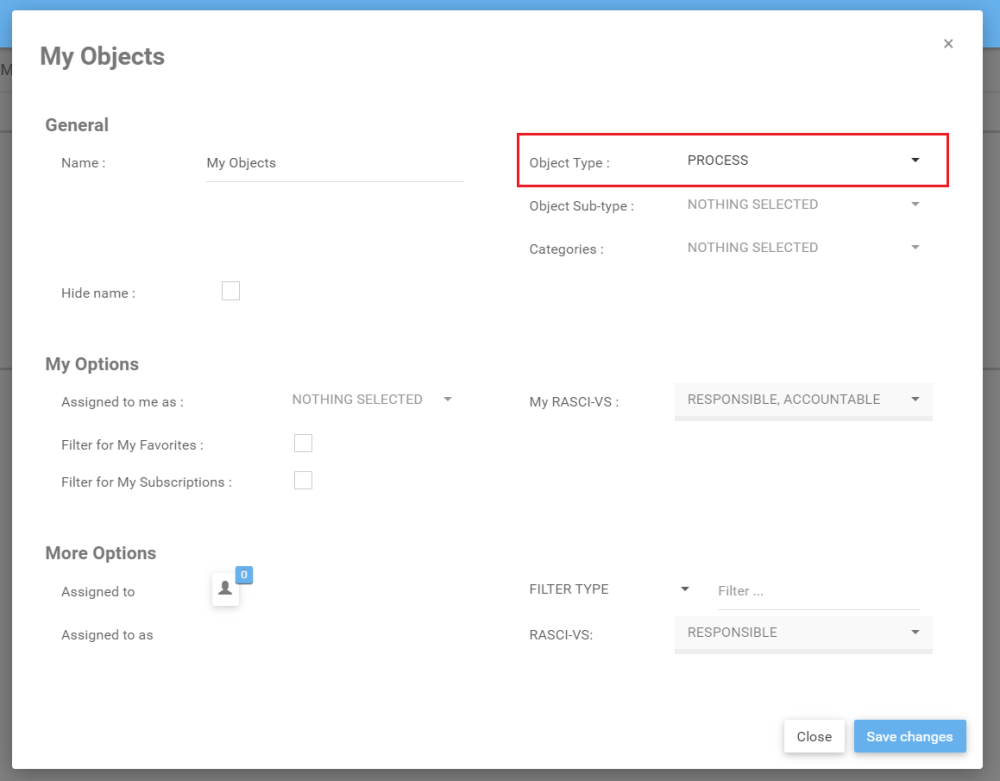
ii. Click on the task bar, which will generate a drop-down menu
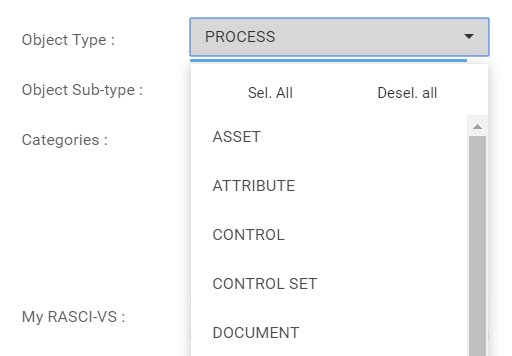
iii. Select/Deselect desired object(s) to be featured in Widget window by navigating cursor and clicking on respective objects. Additionally, the drop-down menu features 

D. Object Sub-Type: Users can use sub-type as an additional filter. This will filter for the selected object type that has a particular sub-type assigned. Sub-Types can be defined by administrators. These sub-types can then be associated to any object in EPC in the object’s properties. Note that only 1 sub-type can be assigned per object. As such, while users are able to select multiple sub-type filters for a single object type, this field will be disabled if the user selects multiple object types, as sub-types may vary between object types. To learn more about sub-types, click here.
Users can select multiple sub-type for a SINGLE object type. To add a filter, follow these steps:
i. Select the Object Sub-Type dropdown
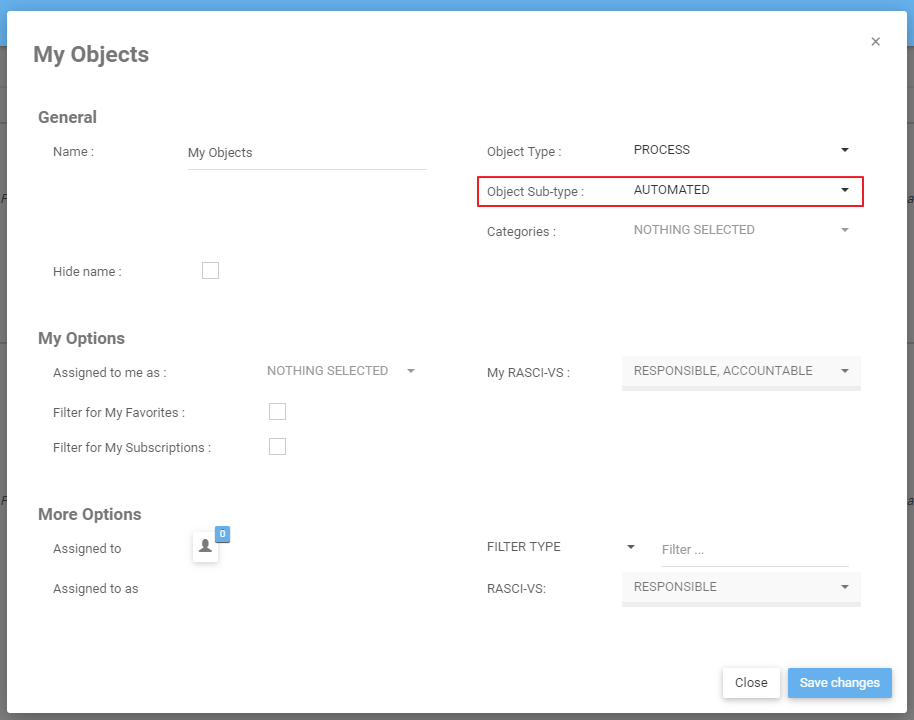
ii. This will generate a dropdown of possible sub-types based on the object type
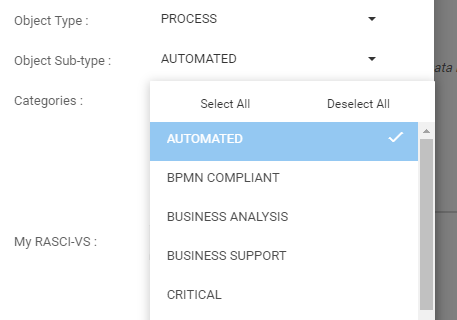
iii. Select one or more sub-type to apply the filter
E. Categories: Objects in EPC can be assigned multiple categories, depending on business needs. Categories are used to classify objects; users might want to filter all processes and assets that are currently outsourced and belong to the IT department. In this case, the “Outsource” and “IT” categories would be used as filters. Note that since multiple categories can be assigned to a single object, users are able to select many object types. To learn more about categories, click here.
To filter objects by categories, follow these steps:
i. Select the Categories dropdown
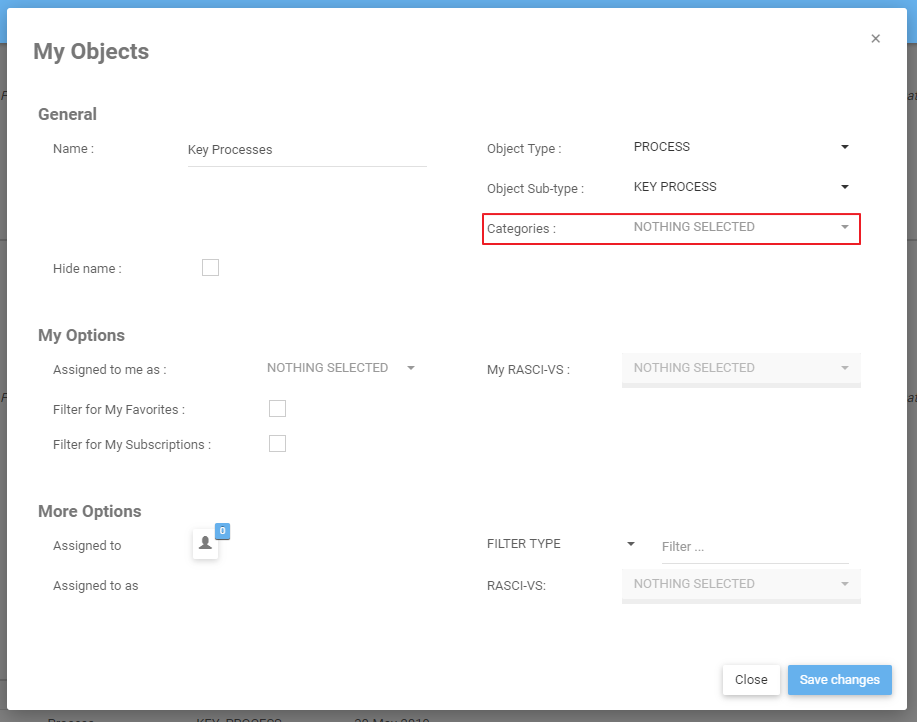
ii. This will generate a dropdown list
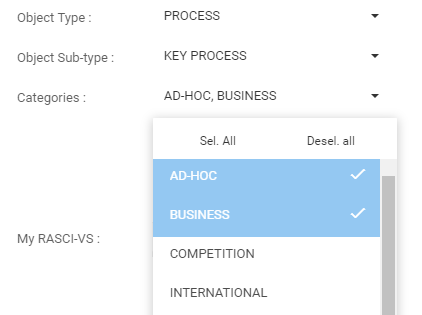
iii. Select one or more categories to apply the filter
F. Displayed Content: Filter the widget content by
- Show Latest: in progress + published content will be displayed
- Published Only: only published content will be displayed
- User Profile Setting: the content displayed will change depending on whether the user has put his EPC in published or show latest mode with the toggle button. If the user is in Show latest, the widget will show the Show Latest option. If the user is in Published Only, the widget will show the Published Only option.
When selecting Show Latest:
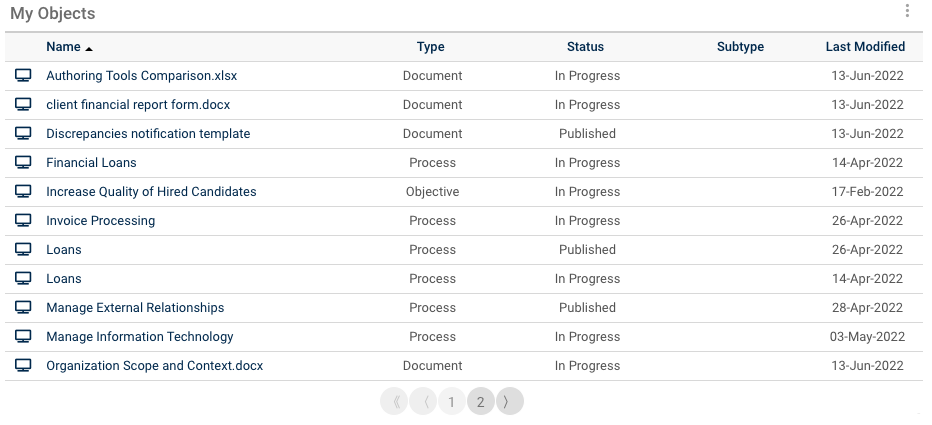
When selecting Published Only:
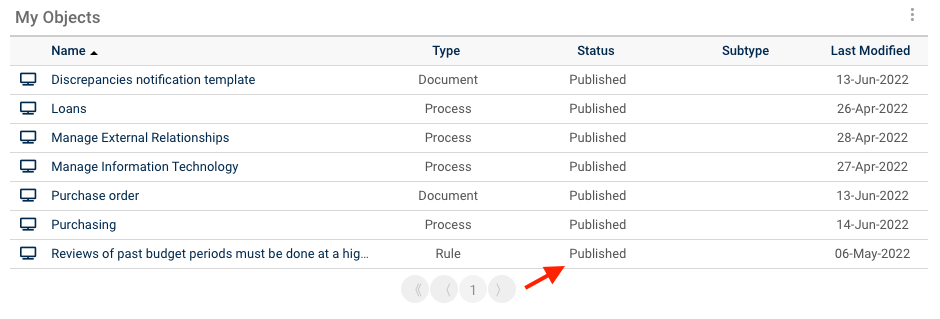
G. Hide Name: To hide the display name of the widget, select this option.
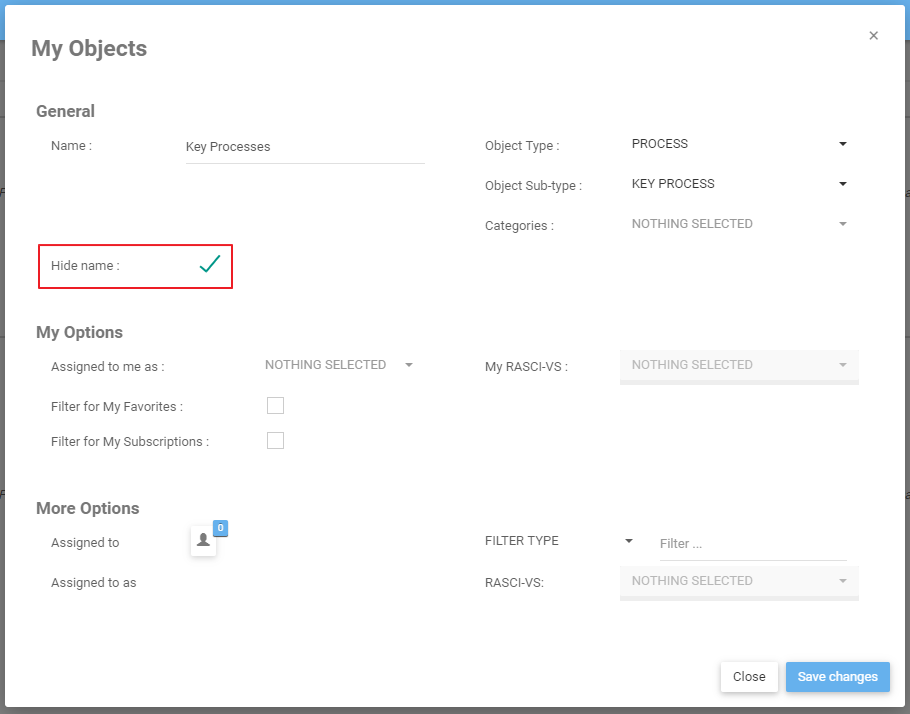
The widget will appear in your page without its display name.

H. Assigned me to as: Roles will be assigned to users by EPC Modelers. Individuals can be assigned one or multiple roles, depending on their versatility within an organization. The reason individuals are often assigned multiple roles that do not necessarily mirror their job contract is to effectively segregate processes while providing appropriate levels of governance.
Example: if an employee works primarily as an HR Coordinator, but also works as an Event Planner for the organization they will be assigned both positions within the EPC, regardless of the specific job title on an individual’s contract.
Once roles have been assigned to users, they will appear in the following section:
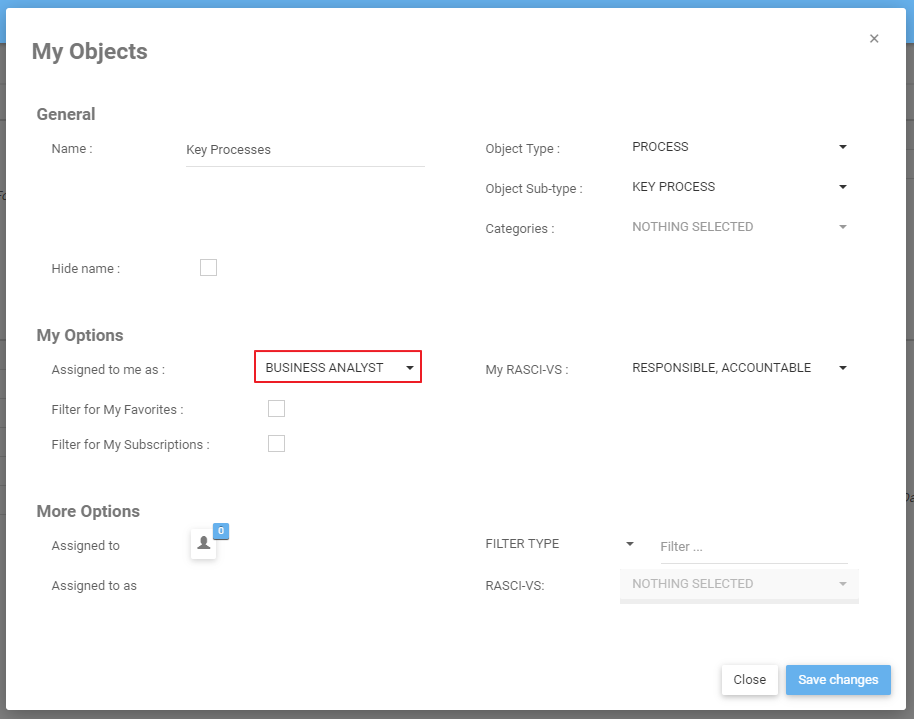
The drop-down list will feature all of the roles and resources that the Web App user has been assigned. As seen below, the list for this specific user is populated with 2 roles (Business Analyst and Support Specialist) and with his specific resource profile (Kevin Tran).
Users can select one, or multiple options to better filter the information within the widget. To select these Options, please see the steps below:
i. Select the “Assigned to me as” Task bar
ii. This generate a drop-down menu
iii. Select the Role or Resource you would like to feature in the Widget by clicking on the item in the list
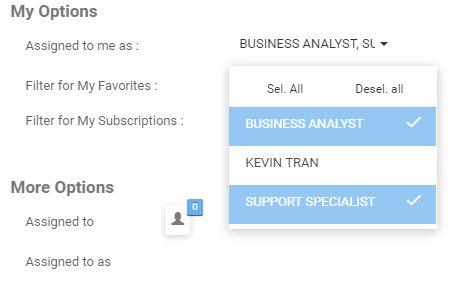
As seen above, the list for this specific user is populated with 2 roles (Business Analyst and Support Specialist) and with his specific resource profile (Kevin Tran).
I. My RASCI-VS: The My RASCI-VS filter allows users to filter through their assigned roles and resources and prioritize them based on their involvement in accordance with the RASCI-VS Matrix. This filter allows users to create Widgets categorized based on their level of involvement.
R – Responsible
A – Accountable
S – Support
C – Consulted
I – Informed
V – Verified
S – Signatory
Please see My RASCI-VS section above for detailed explanation of the RASCI-VS Matrix in Section 3.4.
Users can select multiple different filters should a user want to include more information within the given Widget.
J. Filter for My Favorites: In order to help users prioritize information for users, a “Filter for My Favorites” section can be used. Users can select the “Filter for My Favorites” option, and Widget will feature only the specific objects that are favorited by a user.
i. To “Filter for My Favorites” , navigate cursor over the tic-box
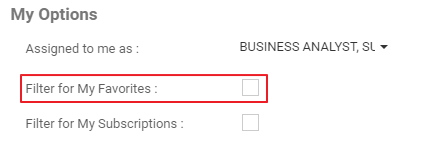
ii. Select option by clicking on box. This will generate a green checkmark to confirm that option has been selected
K. Filter for My Subscriptions: In order to help users prioritize information for users, a “Filter for My Subscriptions” section can be used. Users can select the “Subscriptions” option, and Widget will feature only the specific objects that the user is subscribed to.
i. To “Filter for My Subscriptions” , navigate cursor over tic-box
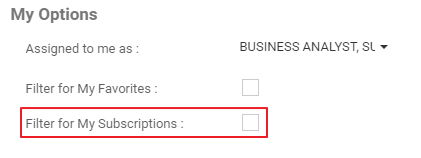
ii. Select option by clicking on box. This will generate a green check mark to confirm that option has been selected
L. Assigned to: This filter is designed for users to view Objects that are associated with specific Roles, Resources, Org Units and Assets. This allows users to see which objects relate to different people and roles within the organization.
Using this filter will extend the scope an individual user can have within the organization.
To use the “Assigned to” filter, please see the following steps
i. Navigate to the My Objects – Settings page
ii. Select the “Filter Type” drop-down menu

iii. A drop-down menu will be automatically generated
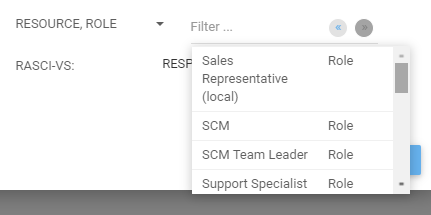
viii. Select the desired object clicking on the desired item. Note that the confirmation of selection from an item will not appear in the drop-down menu. It will appear in the 
ix. Click on the icon and it will display the selected object

M. Assigned to as: The “Assigned to as” filter is an extension of the “Assigned to” filter. It allows for further segmentation and classification of objects selected using the RASCI-VS Matrix. This allows users to view additional Objects, who/what is related to them, and how they are related.
Note that this filter is locked until a user has properly selected an object in the “Assigned to” filter.
To filter using the Assigned to as function, please see the following instructions:
i. Navigate to the My Objects – Settings page
ii. Select Object in “Assigned to” Filter. Please see the Assigned to (G) above for further detail.
iii. After having selected a (or multiple) objects in the Assigned to section, navigate your cursor to the RASCI-VS drop down menu
iv. A dropdown menu will be generated for RASCI-VS filter selection
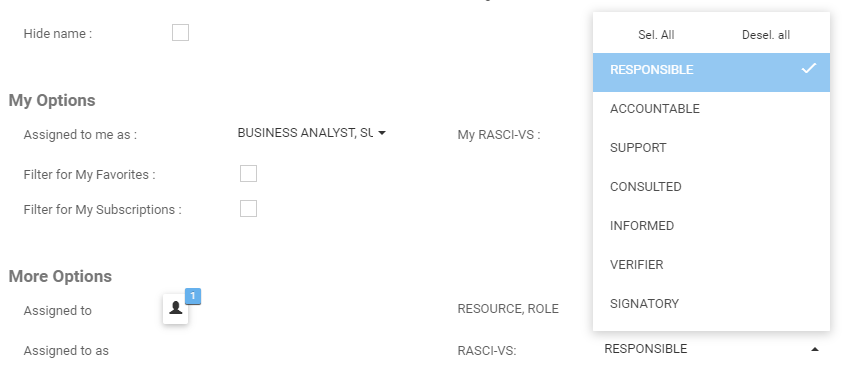
v. Select appropriate RASCI-VS metrics. Note that users can select multiple RASCI-VS metrics for viewing.
Need more help with this?
Visit the Support Portal




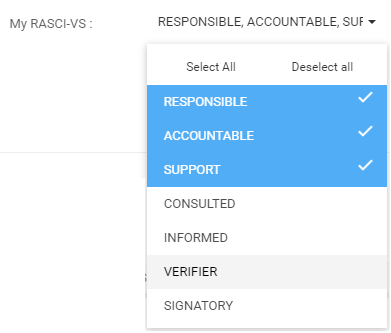
 buttons listed above the auto-populated list. These are navigation arrows that let users sift through the different pages on search results generated.
buttons listed above the auto-populated list. These are navigation arrows that let users sift through the different pages on search results generated.